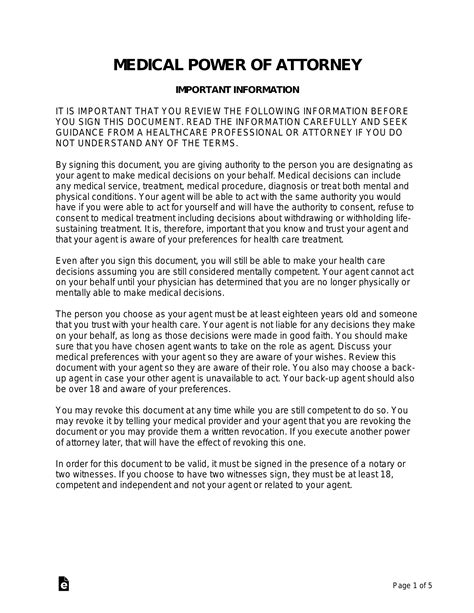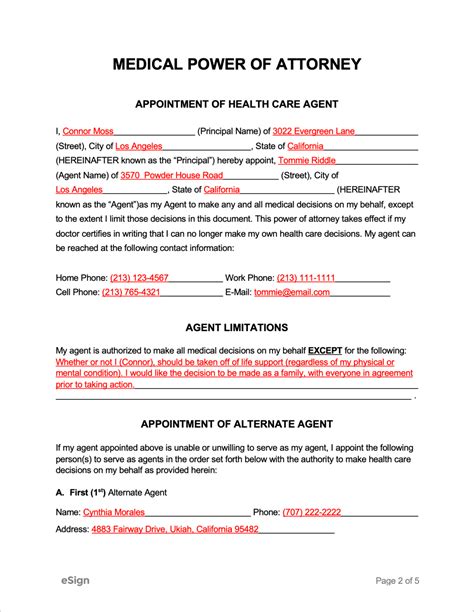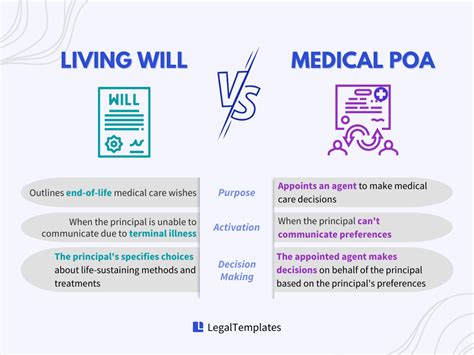Intro
Discover the medical power of attorney guide, covering advance directives, healthcare proxies, and living wills, to ensure your medical wishes are respected and executed, with expert advice on durable power of attorney and end-of-life care planning.
The importance of having a medical power of attorney cannot be overstated. As individuals, we often take our health and well-being for granted, but unforeseen circumstances can arise at any moment, leaving us unable to make decisions for ourselves. This is where a medical power of attorney comes into play, allowing us to appoint a trusted individual to make medical decisions on our behalf. In this article, we will delve into the world of medical power of attorney, exploring its benefits, working mechanisms, and steps to create one.
Having a medical power of attorney in place can provide peace of mind, knowing that our wishes will be respected and carried out even if we are unable to communicate them ourselves. It is an essential component of any comprehensive estate plan, allowing us to maintain control over our medical care and ensure that our values and preferences are respected. Whether we are young or old, healthy or struggling with a chronic condition, having a medical power of attorney is a crucial step in taking charge of our healthcare.
As we navigate the complexities of the healthcare system, it is essential to understand the role of a medical power of attorney and how it can impact our lives. From the benefits of having a medical power of attorney to the steps involved in creating one, we will explore every aspect of this critical document. We will also examine the differences between a medical power of attorney and other advance directives, such as a living will, and discuss the importance of choosing the right agent to act on our behalf.
What is a Medical Power of Attorney?

The medical power of attorney document outlines our preferences and values regarding medical treatment, including the types of care we want to receive, the treatments we want to avoid, and the circumstances under which we want life-sustaining measures to be withdrawn. By having a medical power of attorney in place, we can ensure that our agent is aware of our wishes and can make informed decisions that align with our values and goals.
Benefits of a Medical Power of Attorney
The benefits of having a medical power of attorney are numerous. Some of the most significant advantages include: * Peace of mind: Knowing that our wishes will be respected and carried out, even if we are unable to communicate them ourselves. * Control over medical care: A medical power of attorney allows us to maintain control over our medical care, even if we are unable to make decisions for ourselves. * Reduced conflict: By outlining our preferences and values, a medical power of attorney can help reduce conflict among family members and healthcare providers. * Improved quality of care: A medical power of attorney can help ensure that we receive the care we want and need, rather than simply receiving the default treatment.How to Create a Medical Power of Attorney

Choosing the Right Agent
Choosing the right agent is a critical component of creating a medical power of attorney. Our agent should be someone we trust to make decisions that align with our values and preferences. Here are some factors to consider when selecting an agent: * Trust: Our agent should be someone we trust to act in our best interests. * Communication skills: Our agent should be able to communicate effectively with healthcare providers and other parties. * Decision-making ability: Our agent should be able to make informed decisions about our medical care. * Availability: Our agent should be available to make decisions and act on our behalf when needed.Medical Power of Attorney vs. Living Will

A medical power of attorney, on the other hand, is a more comprehensive document that appoints an agent to make medical decisions on our behalf. While a living will provides guidance on end-of-life care, a medical power of attorney provides guidance on a broader range of medical decisions, including treatment options, medication, and hospitalization.
Differences Between a Medical Power of Attorney and a Living Will
Here are the key differences between a medical power of attorney and a living will: * Purpose: A living will provides guidance on end-of-life care, while a medical power of attorney appoints an agent to make medical decisions on our behalf. * Scope: A living will is limited to end-of-life care, while a medical power of attorney covers a broader range of medical decisions. * Agent: A medical power of attorney appoints an agent to make decisions, while a living will does not.State-Specific Laws and Regulations

Understanding State-Specific Laws and Regulations
To understand state-specific laws and regulations, we should: * Research our state's laws and regulations regarding medical power of attorney. * Consult with an attorney or healthcare professional to ensure that our document is valid and enforceable. * Review and update our document regularly to ensure that it remains compliant with state laws and regulations.Conclusion and Next Steps

We invite you to share your thoughts and experiences with medical power of attorney in the comments below. Have you created a medical power of attorney for yourself or a loved one? What challenges or benefits have you encountered? By sharing our experiences and insights, we can help others navigate the complexities of medical power of attorney and make informed decisions about their healthcare.
What is a medical power of attorney?
+A medical power of attorney is a legal document that appoints a trusted individual to make medical decisions on our behalf if we become incapacitated or unable to communicate.
How do I create a medical power of attorney?
+To create a medical power of attorney, we should choose an agent, determine the scope of authority, complete the necessary forms, sign and notarize the document, and distribute it to our agent, healthcare providers, and other relevant parties.
What is the difference between a medical power of attorney and a living will?
+A medical power of attorney appoints an agent to make medical decisions on our behalf, while a living will provides guidance on end-of-life care. A medical power of attorney is a more comprehensive document that covers a broader range of medical decisions.
